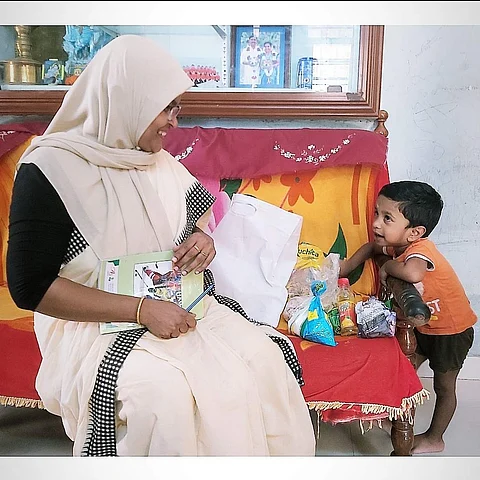

Through the bottom grille of the metal gate, Aaron peered at the road. It was 11 am in the morning and the sun shone brightly above his head. Yet, he did not move a muscle. A few minutes later, he spotted a familiar face walking towards his house.
It was Sunila P A, his Anganwadi worker.
Holding a heavy cloth bag, Sunila opened the gate. Aaron's face instantly brightened. Smiling, he ran inside the house, only to return with a box of chocolates, which he extended to his dear 'teacher'. "It is his third birthday," says his mother Lavanya Manoj. "Aaron was quite sad about not being able to go to the Anganwadi. Since the beginning of this month, he had been planning on giving chocolates to everyone there. But he knew that you'd come home today and he couldn't wait to give you chocolates," she tells Sunila. With a shy smile, Aaron took out an eclair and gave it to Sunila. Handing over the bag to Lavanya, Sunila picks up little Aaron and plants a kiss on his left cheek. "Happy birthday, my dear. I miss you children a lot at the Anganwadi," says this worker, who handles 18 tiny tots in an Anganwadi in North Paravur in Ernakulam.
It has been close to a week since Aaron had gone to the Anganwadi, like all the other children in Kerala. Owing to the pandemic COVID-19 outbreak, the Kerala government had ordered the closure of all schools, colleges and Anganwadis since March 10, until the end of the month. However, realising that this may hamper the children's regular access to nutritious meals, the Anganwadi workers were asked to deliver mid-day meals to the children at their homes.
About 3.75 lakh children attend Anganwadis across the state. They are provided with nutritious meals every day, free of cost. "Upon the Chief Minister's instruction, we have started distributing meals to all the children who are attending Anganwadis in the state. About 3.7 lakh children in 33,115 Anganwadi in the state will benefit from the initiative,” wrote K K Shailaja, Minister for Health and Social Justice, Government of Kerala, in a Facebook post.
But back to our journey with Sunila.
Curiously looking at the bag she carried, I wondered what it held. She emptied the contents of the cloth bag to show them to me. It contained a bag of rice, dal, wheat, two blocks of jaggery, a packet of rice flour, ragi powder, rice flakes, urad dal and a small bottle of oil. Upon pouring the oil into another bowl, Lavanya returned the bottle and the bag to Sunila. "Since the Kerala government's plastic ban, there is a dearth of bottles and bags to carry things. But we somehow find a way to work through things," Sunila smiles. "Make sure that you eat your meals well at home too. You used to be a good boy there," she tells Aaron as she leaves.
While initially, the government had asked the Anganwadi workers to deliver cooked meals to children's homes, they now deliver the groceries sufficient enough to cook meals for these 18 working days. Upon sending a list of children to the government's Integrated Child Development Services (ICDS) department, the government sends sufficient groceries to the Anganwadis, which are further delivered to homes. "This is much easier. This way, we can deliver things in one go. It is easier for us and the parents," says Sunila.
While she delivers it to most of the homes, some parents voluntarily pick them up from the Anganwadi. "The bag is quite heavy and I cannot carry more than one at a time. So, after delivering the groceries to one child, I go back to the centre, pick up the next bag and go to the next child's house," she says. However, she had no complaints about this. "The government is doing its best to keep the pandemic under control. So, this is the least we can do," she adds.
The Anganwadi workers do not receive an extra honourarium for this work. They do not expect any either. "It is our duty to interact with the public and spread awareness. We have signed up for this," says Sunila. "We go to people's homes for surveys and to distribute polio drops to children," she says. However, despite extensively interacting with the public, they are not provided with masks, hand sanitisers or gloves. Sunila tells us that she takes care to wash her hands quite frequently these days and sometimes covers her nose and mouth with her hijab.
Back at the Anganwadi, the helper Sreelatha packed the bulk groceries into separate packets. A young mother helped her out. "I have a two-wheeler and our house is quite far. So, I thought I'd come and pick it up myself, rather than making her walk all the way," she says. "I had some time in hand today, so I volunteered to help," she says.
After picking up two more bags, Sunila and I walked to the homes of two-year-old Adikesh and four-year-old Srihari. The former ran to Sunila and hugged her, while she handed over the bag to his grandmother. "Do not send the child anywhere. Make sure that you follow the government's advisory," she tells the grandmother. While going back, the child waves her bye and blows her a kiss. She blows one back to him. "I will see you soon, Keshu. You will play with your friends soon," she says, as she walks back.
